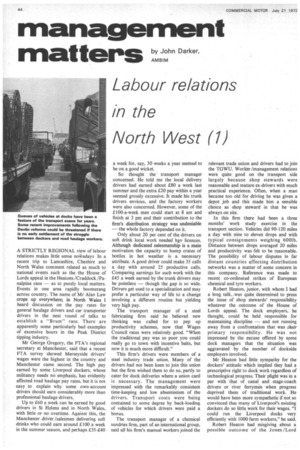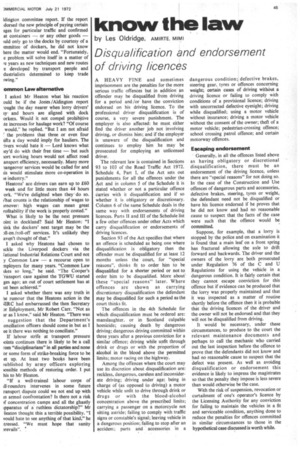management matters
Page 46

Page 47

If you've noticed an error in this article please click here to report it so we can fix it.
Labour relations in the North West (1)
by John Darker,
AMBIM A STRICTLY REGIONAL view of labour relations makes little sense noiVadays In a recent trip to Lancashire, Cheshire and North Wales comment related as much to national events such as the the House of Lords appeal in the Heatons /Craddock /Panalpina case — as to purely local matters. Events in one area rapidly boomerang across country. The name of Mr Alan Law crops up everywhere; in North Wales I heard discussion on the pay rates for general haulage drivers and car transporter drivers in the next round of talks to establish a "Brum" rate. There are apparently some particularly bad examples of excessive hours in the Peak District tipping industry.
Mr George Gregory, the FTA's regional secretary at Manchester, said that a recent FTA survey showed Merseyside drivers' wages were the highest in the country and Manchester came second. The high pay earned by some Liverpool dockers, whose militancy needs no emphasis, has evidently affected road haulage pay rates, but it is not easy to explain why some own-account drivers should earn considerably more than professional haulage drivers.
Up to £60 a week can be-earned by good drivers in St Helens and in North Wales, with little or no overtime. Against this, the Manchester driver /salesmen delivering soft drinks who could earn around £100 a week in the summer season, and perhaps £35-£40 a week for, say, 30 weeks a year seemed to be on a good wicket.
So thought the transport manager concerned. He told me the local delivery drivers had earned about £80 a week last summer and the extra £20 pay within a year seemed grossly excessive. It made his trunk drivers envious, and the factory workers were also concerned. However, some of the £100-a-week men could start at 8 am and finish at 3 pm and their contribution to the firm's distribution strategy was undeniable — the whole factory depended on it.
Only about 20 per cent of the drivers on soft drink local work needed hgv licences. Although dedicated salesmanship is a main motivation the capacity to hump crates of bottles in hot weather is a necessary attribute. A good driver could make 35 calls a day with around 25 productive calls. Comparing earnings for such work with the £45 a week earned by the trunk drivers may be pointless — though the gap is so wide. Drivers get used to a specialization and may prefer a particular way of life to a change involving a different routine but yielding very high pay.
The transport manager of a steel fabricating firm said he believed new thinking was called for to pep up productivity schemes, now that Wages Council rates were relatively good. "When the traditional pay was so poor you could really go to town with incentive baits, but now it is much more difficult."
This firm's drivers were members of a steel industry trade union. Many of the drivers had not been keen to join this union but the firm wished them to do so, partly to cater for dock deliveries where a union card is necessary. The management were impressed with the remarkably consistent time-keeping and low absenteeism of the drivers. Transport costs were being contained to some degree by back-loading of vehicles for which drivers were paid a bonus.
The transport manager of a chemical sundries firm, part of an international group, said all his firm's manual workers joined the relevant trade union and drivers had to join the TGWU. Worker /management relations were quite good on the transport side largely because shop stewards were reasonable and mature ex-drivers with much practical experience. Often, when a man became too old for driving he was given a depot job and this made him a sensible choice as shop steward in that he was always on site.
In this firm there had been a three months' work study exercise in the transport section. Vehicles did 90-120 miles a day with nine to eleven drops and with typical consignments weighing 600lb. Distance between drops averaged 20 miles and productivity was felt to be reasonable. The possibility of labour disputes in far distant countries affecting distribution networks was a matter of some concern in this company. Reference was made to recent co-ordinated strikes of European chemical and tyre workers.
Robert Heaton, junior, with whom I had a long talk, was quite determined to press the issue of shop stewards' responsibility whatever the outcome of the House of Lords appeal. The dock employers, he thought, could be held responsible for maintaining discipline — and not running away from a confrontation that was their primary responsibility. He was not impressed by the excuse offered by some dock managers that the situation was aggravated by the number of dockside employers involved.
Mr Heaton had little sympathy for the dockers' attitude which implied they had a prescriptive right to dock work regardless of technological progress. Their plight was in a par with that of canal and stage-coach drivers or river ferrymen when progress deprived them of traditional work. He would have been more sympathetic if not so convinced that many of Liverpool's existing dockers do so little work for their wages. "I could run the Liverpool docks very efficiently with 1000 farm workers," he said.
Robert Heaton had misgiving about a possible outcome of the Jones/Lord Idington committee report. If the report tdorsed the new principle of paying certain ages for particular traffic and confirmed at containers — or any other goods — , iuld only go to the docks by courtesy of a immittee of dockers, he did not know here the matter would end. "Fortunately,
e problem will solve itself in a matter of re years as new techniques and new routes .e developed by transport people and dustrialists determined to keep trade wring."
ommon Law alternative
I asked Mr Heaton what his reaction ould be if the Jones /Aldington report -ought the day nearer when lorry drivers' ty and hours are aligned with dock orkers. Would it not compel prohibitive ite increases for haulage work? "Of course would," he replied. "But I am not afraid the problems that three or even four lifts a day would imply far hauliers. The rivers would hate it — Lord knows what iey'd do with their free time — but such tort working hours would not affect road ansport efficiency, necessarily. Many more mingeover services would be called for and uswould stimulate more co-operation in le industry."
Heatons' ace drivers can earn up to £60 week and for little more than 44 hours .ork. "We're delighted when they do so. /hat counts is the relationship of wages to 'mover: high wages can mean great rofitability if the work is properly coned." What is likely to be the next pressure oint in dockland? Said Mr Heaton: "I link the dockers' next target may be the Al-an/roll-off services. It's unlikely they aven't thought of that."
I asked why Heatons had chosen to ickle the Liverpool dockers via the Tational Industrial Relations Court and not y Common Law — a recourse open to mployers for many years. "Common Law akes so long," he said. "The Cooper's 'ransport case against the TGWU started ges ago; an out of court settlement has at at been achieved."
I asked whether there was any truth in lie rumour that the Heatons action in the ,IIRC had embarrassed the then Secretary Dir Ernployment, Mr Robert Cam "Not as ar as I know," said Mr Heaton. "There was
suggestion that the Department's onciliation officers should come in but as I ee it there was nothing to conciliate."
If labour strife at transport pressure ioints continues there is likely to be a call rout "disciplinarians" in all parties and none or some form of strike-breaking force to be et up. At least two books have been mblished by army officers exploring xissible methods of restoring order. I put his to Mr Heaton.
"If a well-trained labour corps of dl:rounders intervenes in some future ransport dispute could we not end up with In armed confrontation? Is there not a risk if concentration camps and all the ghastly ipparatus of a ruthless dictatorship?" Mr -leaton thought this a terrible possibility. "I would hate to see anything of that kind;" he tressed. "We must hope that sanity wevails".




























































































